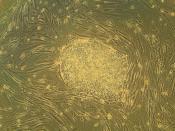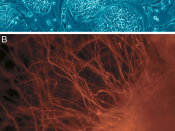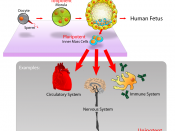In June of 2004, former President Ronald Regan died of Alzheimer's disease after having suffered from it for over a decade. Former First Lady Nancy Regan immediately began lobbying for President Bush to be more lenient with regard to embryonic stem cell research, which in theory, could have saved her husband from his years of suffering and his eventual death. Embryonic stem cell research has been a topic of widespread debate for as long as it has existed. The dividing factor in the debate over embryonic stem cell research is, to put it very simply, whether an embryo is a person or not. Generally, those categorized as being "pro-choice" do not consider an embryo to be a person and are therefore greatly in favor of the continuation and increase of embryonic stem cell research. Conversely, those who are categorized as being "pro-life" do consider an embryo to be a person and therefore oppose any embryonic stem cell research.
However, an embryo's death is insufficient to warrant the cessation of embryonic stem cell research because this research will lead to the prevention of countless years of suffering, as well as countless deaths.
Stem cells, also known as pluripotent cells, are some of the first cells to exist in a human embryo. Over time, each specific group of stem cells develops into one of the 220 types of more complex cells, which will make up an organ in an organism. Embryonic stem cell research is the researching of methods that can be used to isolate, extract, and develop groups of stem cells from embryos with the purpose of furthering human health. Embryonic stem cells are collected from embryos after the embryos are placed under a microscope and the stem cells are isolated and extracted. This process results in the death of the...


